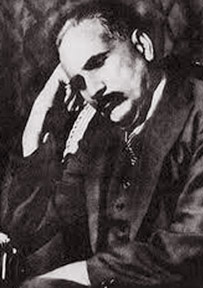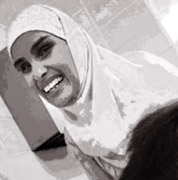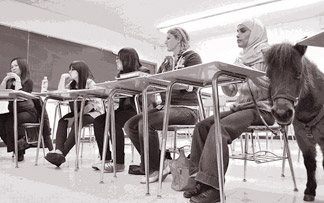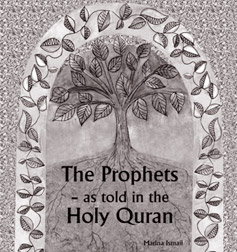|
Inspiring philosopher- poet of Islam, Allama Mohamed Iqbal
Islam is a complete pattern of living with a code of
life :
A M A Azeez
Philosopher-Poet of Islam Allama Sir Mohammad Iqbal, born in the year
1873 and died in 1938 with a smile on his face , came to us with a
special message. By his poems and philosophy, by his speeches and
writings, by his political activities and personal discourses, he
dissipated our doubts and restored our faith, brought us conviction and
courage, and thus exhorted and inspired us. He stressed that Islam was a
complete pattern of living with a Code of Life and not a mere religion
in the narrow and somewhat popular sense of the word.
|

Allama Mohamed Iqbal |
“The modern man with his philosophies of criticism and scientific
specialism finds himself in a strange predicament. His naturalism has
given him an unprecedented control over the forces of Nature but has
robbed him of faith is his own future…. Wholly over-shadowed by the
result of his intellectual activity, he has ceased to live soulfully,
i.e. from within. In the domain of thought he is living in open conflict
with himself, and in the domain of economic and political life he is
living in open conflict with others. He finds himself unable to control
his ruthless energy and infinite gold hunger which is gradually killing
all higher striving in him and bringing him nothing but life-weariness.”
Iqbal does not, however, advocate a total repudiation of the West;
nor does he think that the Eastern Society should close itself
hermetically against the culture of the West. Instead, he advocates a
critical appraisal of the West and the understanding of its sources of
strength as well as of its weakness with a view to the adoption and
assimilation by the East of all that is good in the culture of the West
without any hindrance to the organic development of the culture and
traditions of the East.
Iqbal finds that science is really the source of the dominance of the
West: And yet the experimental method of science and technology is
certainly not an European discovery. Iqbal proves that it was something
inspired and greatly encouraged by the Holy Quran and was practiced
assiduously by the Muslims till Muslim Society was undermined by the
extraneous influence of Greek speculation and degenerate mysticism that
unfortunately became popular, during a later period.
Neglect of science was, therefore, not due to any basic defect in the
Islamic teaching itself. With a wealth of illustrations and quotations
from the Holy Quran, Iqbal demonstrates that Islam is definitely opposed
to a static view of the universe and encourages Man’s conquest of
Nature. Of all the creations of God, Man alone is possessed of a
personality and is endowed with the status of God’s Vicegerent – Khalifa,
which enables him to become “an active participant in the creative
activity of his Maker.” Iqbal stresses that Man is born free and
therefore should not choose the path of the slave. He need not be a serf
to any priest or potentate.
“It is the lot of man to share in the deeper aspirations of the
universe around him and to shape his own destiny as well as that of the
universe, now by adjusting himself to its forces, now by putting the
whole of his energy to mould its forces to his own ends and purposes.
And in this process of progressive change God becomes a co-worker with
him provided man takes the initiative.”
World and matter are thus to be subordinated to human personality and
human ends and not to be regarded as just illusions, to be abhorred or
ignored. “True self-development according to Islam would come not by
renunciation but through a proper adjustment of man’s relations to the
external world in the light of inspiration received from the inner
world.”
Western Science is therefore not alien to Islam but a part of it, and
there should therefore be no difficulty in the assimilation of this
Science. In fact, true Islam demands such an assimilation. In this
process, the deficiencies of the West should not however be forgotten,
namely: Without Religion there is no salvation for mankind. And Iqbal
emphasized that Power without Vision and Science without Religion and
Politics without Morality would lead Humanity to be sure perdition both
in the Here and Hereafter.
He explains that Islam demands of its votaries the strengthening of
the Self – Khudi, with the aid of a society characterized by the
conception of the Oneness of God, and the finality of the Holy Prophet;
and every one of the five principles of Islam has a special significance
in the journey of the Self towards its freedom.
The social or sociological implications of such developed selves
living in such a society are not left unexpanded by Iqbal;“Islam
recognizes the worth of the individual, and disciplines him to give away
his all to the service of God and man. Its possibilities are not yet
exhausted. It can still create a new world where the social rank of man
is not determined by his caste or colour, or the amount of dividend he
earns, but by the kind of life he lives; where the poor tax the rich,
where human society is founded not on the equality of stomachs but on
the equality of spirits…. where private ownership is a trust and where
capital cannot be allowed to accumulate so as to dominate the real
producer of wealth.”
These, Iqbal points out, are derived from the distinctive features of
the Islamic Society some of which are specifically treated in his poems
and lectures: Islam’s abolition of all the artificial and pernicious
distinctions of caste, creed, colour and economic status, its abhorrence
of narrow nationalism and its strong advocacy of patriotism, Islam’s
encouragement of science and self-development, its emphasis on equality,
solidarity, freedom and tolerance, its distinctive doctrine of
unadulterated and unalloyed monotheism – tawhid which banishes all fears
except the fear of God, Islam’s acceptance of the inspired leadership of
the Last Prophet, its possession of a Code for the guidance of Society
in all spheres of Life, its goal of man as the Vicegerent of God, its
emphasis on Man as the trustee of a free personality which he accepted
at his peril and which betokens God’s trust in Man, its conception of
Taqdir or destiny and its conception of the Ideal Character.
“This Society of Islam has thus one single purpose running through
its mind, a unity of sentiments inspiring its being and a single
criterion for good and evil, and a basis enshrined in the sanctuary of
our hearts.” The Quranic description of the righteous as “those who
believe and do good” makes it clear that in the living religion of Islam
there is no division between dogma and deed, between creed and conduct;
nor is there dissociation of belief from behaviour, or faith from
action.
A good Muslim according to Iqbal is one, “who develops all his powers
and strengthens his individuality through active contact with his
material and cultural environment.
This strong, concentrated individuality sharpened and steeled through
a life of an active experience, is to be dedicated to the service of the
Lord in whose name he is out to conquer the world.
But when the world lies conquered at his feet, he is strong enough to
stand aloof from and superior to, the well nigh irresistible temptations
which weaken the moral fiber.
His self-respect gives him courage and adventurousness: his tolerance
and respect for the rights and personality of others make him sensitive
to the claims which their common humanity makes on him. In the pursuit
of his ideals he is strong enough to defy with contempt the vested
interests and forces which stand in the way of their realization.”
Iqbal thus belongs to our century; he has a special message for our
time and a solution for the cultural conflicts of our period. He asks us
to achieve a synthesis of the cultures of the East and the West, gaining
a new vitality from the healthy sources of our past culture.
He has given us a glimpse of Islam, pristine and pure and has
exhorted us to go in quest of it, trusting in the Almighty and placing
reliance in ourselves and without being oppressed or overwhelmed by the
extremes of either scholasticism or Sufism. Iqbal thus becomes our
modern guide of Islam, who has shown us the old path, having himself
cleared it of the dead leaves and fallen trees that were impeding the
progress of the travelers And to Humanity in general Iqbal has given a
dynamic message of a life of striving and courage motivated by the fear
of God. This article was written by A.M.A.Azeez, well known Muslim
scholar , in 1964.
Blind student and her guide horse
|

Leading the blind: Mona Ramouni has bought and trained a
miniature horse, Cali, to be her guide The psychology student
used three years of savings from her job at a Braille
proofreading company to pay for a horse to be trained to act as
her guide. |
|
 |
As a blind Muslim woman, Mona Ramouni
has had to make do without a guide dog her whole life. The 28-year-old's
strictly religious parents would not allow a dog in the house,
considering the animal unclean. But then Ramouni stumbled across a
website article about miniature guide horses in April 2008. ‘It was
something that I never thought about for myself,’ she said.
|

Horses for courses: Ramouni and Cali attend a seminar at
Michigan State University |
Ramouni treats Cali to some water since welcoming three-year-old
guide horse Cali into her Dearborn, Michigan, home last year, Ramouni
has seen her life turned around.
Cali measures about 2ft 6in tall and has been taught to stand still
indoors. She also helps Ramouni get out of vehicles and move through
crowds. Her proud mistress said: ‘She is an awesome little horse.
What I really want is to be able to take her places neither of us
would have been able to go without each other. ‘Before Cali, I had given
up. I got to the point where I thought, ‘Im going to get nothing out of
my life.
Cali has given me the confidence back I used to have as a kid.’ Born
three months premature, Ramouni lost her sight shortly after birth.
Among the challenges she had to overcome in order for Cali to stay at
her home were getting a permit to place a large shed in her familys
garden and to find a farrier to look after the horses hooves. Her
friends warned her it would be a difficult thing to do.
But Ramouni said: ‘The more everybody told me “No, dont do it,” the
more I wanted to do it,’ she said. ‘I got to a point in my life where I
thought... “Why should I settle for something less than I can have?”
‘There have been so many obstacles. People said ‘Youll never find a vet.
Youll never find a farrier.” I found them all.’ She added: ‘More than
even the independence, I found that Cali showed me that there are
possibilities.’
The Prophets - as told in the Holy Quran
The 115 page book “ The Prophets-as told in the Holy Quran” has been
a long felt need by Muslims worldwide. Instead of going through the
entire Holy Quran to know what the Holy Quran says about Allah’s
Messengers and Prophets this book provides ready reference to 25 most
important Messengers and the four Prophets who were given the
scriptures.
This is the timely work of Marina Ifthie Ismail, daughter of yester
year’s well known Muslim scholar A. M.A.Azeez, respected by all
communities alike. Explaining the circumstances which led to writing
this book Marina Ifthie Ismail, with an Honours Degree in Geography and
later obtained her M.Phil, says that that the thought of compiling this
book came about as a result of the numerous questions posed by her
grandsons about the Prophets and Islam. She described it as a most
interesting and rewarding endeavour to write the series of the lives of
the Prophets as revealed in the Holy Quran without including the
versions in the Sayings of Prophet Muhammad (PBUH).

Allah chose four Prophets and revealed the Scriptures or Books to
them so that they could convey His Message to the world. The Message
contained in these Scriptures is the same and therefore the Holy Quran
states that there should be no distinction among His Prophets and the
Messengers.
The Prophets who received the Scriptures or Books are Dawood ( Zaboor-Psalms,
Moosa(Taurat-Torah), Isa ( Injil-Gospels and Muhammad Furkhan _ Holy
Quran.)
Apart from these four Prophets Allah sent other Messengers to confirm
the scriptures and also to convey His Message to the people at times
when they forgot him.
The book deals in brief the history of 25 Prophets starting from
Adham( Adam) to Prophet Muhammad( PBUH).The other prophets included
Idris(Enoch), Nuh ( Noah), ,Hud(Hood),Salih(Shiloh),Ibrahim(
Ibraham),Lut(Lot),Shu’aib(Jethro),Ismail(Ishmael),Ishaq(Isaac),Yusuf(Joseph),
Yakoob( Jacob),Yoonus( Jonah), Ayyub(Job) Moosa(Moses), Illyas,Elijah
nor Elias, Al-Yasa ( Elisha), Shamweel (Samuel),Dawood (David), Sulaiman(
Solomon), Uzair (Ezra), Zakariya ( Zachariah), Yahya (John) and Isa
(Jesus).
As explained in the introduction to the book a Prophet or Messenger
in Islam is a human being chosen by Allah to convey His Message to the
world. The Message is basically the belief in the One God ( Allah) and
to follow God’s Will.Throughout the ages, from time to time, Allah has
sent Prophets or Messengers to misguided communities who had forgotten
Allah and chose to worship idols and become disbelievers.
Allah chose the Messengers from among the people to make it easier to
understand what they preached and follow His path. For example Prophet
Ibrahim was sent to the people of Babylon, Prophet Dawood to the
Israelites or the Children of Israel and Salih to the tribe of Thamud.
Allah chose a human being as a Prophet or Messenger and not an Angel
because the people would have rejected a heavenly being saying” we are
human, we eat and drink, we have families and we die unlike you.,
However Allah employed Angels as Messengers to carry out his order, as
when he sent Angels to destroy the people of Lut.
The Prophet and Messengers chosen by Allah were those with
exceptional qualities- they were of good character, trustworthy and with
an unwavering faith in Him. They conveyed Allah’s Message against many
odds, persevering with courage and determination, despite many people
and communities rejecting them.
Abortion in Islam
Many Muslims and others raise the question of abortion in Islam.
Sometimes misinformation is worse than ignorance. It is therefore useful
to shed some light on this issue from an Islamic perspective.
Humans are the most favoured creation of the Creator, Allah who said
“And indeed We have honoured the children of Adam, carried them on land
and sea, gave them lawful, pure provisions, and greatly preferred them
above many of those We have created.” (Al-Isra,17:70). Among these signs
of Allah’s favour on the children of Adam, is the sacred value Allah
assigns to the life of a human being. When that value was violated with
the first unlawful murder of a human being on earth, when one of Adam’s
sons killed his own brother out of malice, Allah condemned that act and
put it on record in the Quran as a reminder, to be recited until the Day
of Judgement.
Allah went even further, making unlawful killing of a single
individual human being equal to mass murder of the whole of mankind:
“Because of that, We ordained for the children of Israel that if anyone
killed a person not in retaliation for murder or for spreading mischief
on earth, it would be as if he killed all mankind. And who saved a life,
it would be as if he saved all mankind.” (Al-Maidah,5:32)
Some Muslims argue that abortion is permissible if the foetus is
younger than four months (120 days). They quote a statement from the
Prophet (PBUH) that refers to a human being starting as a fertilised
ovum in the uterus of the mother for forty days, then it grows into a
clot for the same period, then into a morsel of flesh for the same
period, then an angel is sent to that foetus to blow the Ruh,life, into
it and to write down its age, deeds, sustenance, and whether it is
destined to be happy or sad. Assuming the hadith to be authentic,
scholars explain that the error comes from understanding that before the
Ruh is blown into the foetus at 120 days, the foetus is not a living
entity, and therefore aborting it does not amount to killing it.
This understanding is wrong, scholars argue, because the foetus is a
living entity right from the moment of fertilisation and implantation on
the wall of the uterus. Scholars explain that the Ruh,life, mentioned in
this hadith of the Prophet (PBUH) is something other than being alive
and only Allah knows what it is, based on the verse in the Quran: “And
they ask you about the Ruh. The Ruh is one of the things the knowledge
of which is only with my Lord, and you, mankind, have been given only
little knowledge.” (Al-Isra,17:85) It therefore becomes clear that
aborting a foetus before 120 days is still killing a living entity, let
alone abortion after that presumed period.
The only case when aborting a foetus, before or after 120 days, is
allowed in Islam, is when a medical situation threatens the life of the
mother, leaving only two options, to let either the other or the foetus
survive, but not both. Scholars argue that such a case can only be
determined by a specialist, trusted and committed Muslim doctor. They
argue that the mother can have other children, whereas the child cannot
make up for losing the mother.
A fatwa (legal ruling) to that effect was issued by Dr Mahmoud
Shaltut, Shaikhul Azhar (Al-Fatawa, p164).Imam Al-Ghazali discussed this
issue in his famous book, Ihya Ulumuddin. Briefly, he asserted that once
the semen from a man fertilised an ovum from a woman, and went into the
womb of the mother, it was indeed a living entity and should not be
intentionally aborted.
Medieval Muslims made stunning math breakthrough
Will Dunham
Magnificently sophisticated geometric patterns in medieval Islamic
architecture indicate their designers achieved a mathematical
breakthrough 500 years earlier than Western scholars, scientists said .
By the 15th century, decorative tile patterns on these masterpieces
of Islamic architecture reached such complexity that a small number
boasted what seem to be “quasicrystalline” designs, Harvard University's
Peter Lu and Princeton University's Paul Steinhardt wrote in the journal
Science.
Only in the 1970s did British mathematician and cosmologist Roger
Penrose become the first to describe these geometric designs in the
West. Quasicrystalline patterns comprise a set of interlocking units
whose pattern never repeats, even when extended infinitely in all
directions, and possess a special form of symmetry.
“Oh, it's absolutely stunning,” Lu said in an interview. “They made
tilings that reflect mathematics that were so sophisticated that we
didn't figure it out until the last 20 or 30 years. ÓLu and Steinhardt
in particular cite designs on the Darb-i Imam shrine in Isfahan, Iran,
built in 1453.
Islamic tradition has frowned upon pictorial representations in
artwork. Mosques and other grand buildings erected by Islamic architects
throughout the Middle East, Central Asia and elsewhere often are wrapped
in rich, intricate tile designs setting out elaborate geometric
patterns.
The walls of many medieval Islamic structures display sumptuous
geometric star-and-polygon patterns. The research indicated that by 1200
an important breakthrough had occurred in Islamic mathematics and
design, as illustrated by these geometric designs.
“You can go through and see the evolution of increasing geometric
sophistication. So they start out with simple patterns, and they get
more complex” over time, Lu added. |



